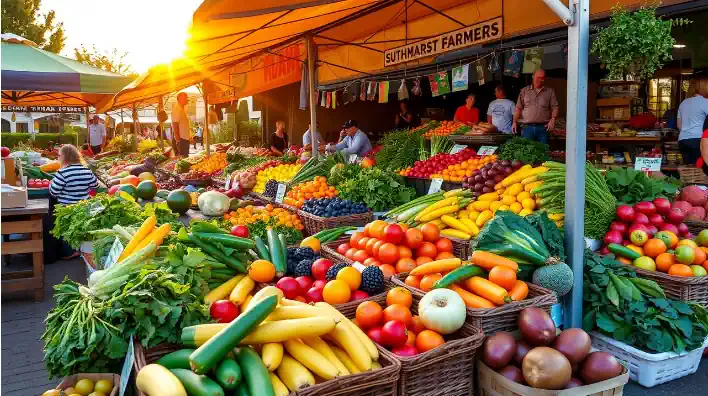Is Plant-Based Meat Really Sustainable? Pros And Cons Revealed!
Plant-based meat is becoming more popular. It’s food made from plants but tastes like meat. People want better ways to eat that are good for the planet. This shift helps reduce harmful gases and saves land.
Vegan burgers, for example, use soy and pea protein. They make 90% less greenhouse gas than beef burgers—pretty amazing! Then there’s lab-grown meat—it cuts methane emissions but can be pricey.
Veggie sausages are also a great pick; they harm the Earth less than regular sausages.
But plant-based meats have drawbacks too. Growing crops like soy uses lots of resources and may hurt soil health as time passes by.
Switching to these sustainable foods could help fight climate change by lowering methane emissions from cows and other animals we farm for meat nowadays… There’s much more to explore on this topic!
Key Takeaways
- Plant-based meats like vegan burgers can lower greenhouse gas emissions by up to 90% compared to beef. They also need less water and land.
- Vegan sausages use fewer resources than traditional meat, but they can face flavour and texture challenges.
- Lab-grown meat has huge potential but is not widely available yet. It cuts down on methane more than plant-based options do.
- Switching to plant-based diets helps the planet by cutting deforestation, conserving natural resources, and reducing livestock farming impacts.
- Growing crops for plant-based meats needs careful management of land and water use. This ensures they stay sustainable.
The Surge in Demand for Sustainable Food Sources
More people want food that does not harm the planet. They seek options that are good for health and kind to nature….

Environmental, social, and economic impacts
Plant-based meat can cut greenhouse gas emissions. Livestock farming emits a lot of methane, a harmful gas. Switching to plant-based options helps fight climate change.
These alternatives also impact society by changing eating habits and market trends. The rise of vegan burgers and meats from plants shifts demand away from traditional meat industries.
This shift affects farmers, retailers, and consumers economically. Resources used in crop production for these products remain an ongoing concern for sustainable practices.
Key Concerns Leading to Shift Towards Plant-Based Meat Alternatives
People worry about livestock methane, environmental harm, and limited natural resources… Discover more about it!

Methane emissions from livestock
Livestock farming produces a lot of methane. This gas is a strong greenhouse gas. Sheep, cows, and goats create methane in their stomachs when they digest food.
Reducing the demand for animal products can help solve climate change issues… Lab-grown meat almost removes all these emissions from traditional farms. Now, let’s explore environmental degradation next!
Environmental degradation
Large-scale farming can lead to soil depletion and biodiversity loss. Deforestation occurs as forests are cleared for livestock grazing and feed crops. This contributes to greenhouse gas emissions, worsening climate change.
Livestock farming causes significant environmental degradation. Methane emissions from cattle harm the atmosphere more than carbon dioxide does. Plant-based meat needs less land, thus preserving forests and reducing pollution.
Plant-based foods help save our planet by minimising deforestation.
Choosing plant-based diets aids in sustainability efforts globally.
Finite nature of natural resources
Traditional meat production needs a lot of land and water. These resources are finite, meaning they can run out soon. Plant-based alternatives usually have a lower carbon footprint.
This makes them more sustainable.
Switching to plant-based meats helps conserve natural resources. For example, producing one pound of beef uses 1,800 gallons of water. In contrast, peas and soybeans require much less water and land but give similar nutrition.
Evaluation of Various Types of Plant-Based Meat Alternatives
Plant-based meats come in many forms. They include vegan burgers, plant-based sausages, and even lab-grown meat….

Vegan Burgers
Vegan burgers use soy, pea protein, and other plant ingredients to mimic beef. Top brands include Beyond Meat and Impossible Foods. These burgers offer a tasty way for people to eat less meat while helping the planet.
Pros include lower environmental impact and no animal farming. Cons are texture issues and higher sodium content.
Eating more plants can save our health and the Earth.
These burgers support ethical vegans by avoiding animal products completely. Brands like Quorn Foods also contribute with their own versions of these meat substitutes.
Meat from Plants
Meat from plants is gaining popularity. Companies like Impossible Foods Inc. and Beyond Meat Inc. are leading the way. These products often use soy protein, wheat protein, legumes, and coconut oil.
These plant-based meats offer many benefits! They generally have a lower environmental impact compared to traditional meat—less water, land, and fewer emissions. But they may face flavour limitations and ingredient sourcing challenges.
Veggie Sausages
Veggie sausages are made from vegetables, grains, and legumes. Common ingredients include soy protein, lentils, chickpeas, whole grains like quinoa or rice. They aim to be both tasty and sustainable.
These veggie options reduce environmental impact by cutting down methane emissions linked to livestock. Their production uses fewer natural resources than traditional meat products.
Brands like Beyond Meat offer various flavours that cater to different tastes while supporting a vegetarian diet focused on wellness and less meat consumption.

Vegan Burgers
Vegan burgers are made from plants and offer many health benefits. Popular brands include Beyond Meat and Lightlife—each with unique flavours and textures.
Ingredients and Popular Brands
Soy, pea protein, lentils, and mushrooms make up the main ingredients in plant-based meat. Brands like Beyond Meat and Impossible Foods lead this market. Beyond Burgers produce 90% less greenhouse gas emissions compared to beef burgers.
Beyond Beef uses simple plant ingredients to mimic the taste of beef, says Patrick O. Brown of Impossible Foods.
These brands aim for a similar texture and flavour as meat with fewer resources. They draw many vegetarians, flexitarians, and those focusing on healthy eating or environmental sustainability.
Pros and Cons
Vegan burgers have pros and cons. Pros: They produce 90% less greenhouse gas emissions compared to a beef burger. They require less land, helping preserve forests. They reduce animal suffering by eliminating the need for livestock.
Cons: Ingredients may be resource-intensive, impacting land and water use. Large-scale farming can lead to soil depletion and biodiversity loss. Some products are highly processed with additives, which can affect health benefits like cardiovascular disease risk.
Lab-grown meat also has its own set of advantages and disadvantages…
Lab-Grown Meat
Lab-grown meat is made by culturing animal cells in a lab. This process has both benefits and drawbacks—read on to learn more….
Production Process
Lab-grown meat starts by taking animal cells. These cells grow in a nutrient-rich medium. The process mimics natural growth but happens faster and is controlled.
Producing cultured meat can occur in cities. This cuts transport emissions, making it more eco-friendly. It uses less land and water than traditional farming practices.
Advantages and Disadvantages
Virtually eliminates methane emissions. Requires significantly less land compared to conventional livestock farming and can improve food security by enabling urban production. Reduced need for animal welfare concerns also appeals to many consumers.
Currently, energy-intensive production needs more sustainable power sources. Costs remain high due to new technology. Consumer hesitance exists because of cultural and psychological barriers regarding lab-grown products.
Veggie Sausages
Veggie sausages offer a tasty option for those looking to eat less meat. They are made from ingredients like soy, wheat gluten, and vegetables… easy on the planet too!
Ingredients and Sustainability
Veggie sausages use various vegetables, grains, and legumes. Common ingredients include quinoa, lentils, and chickpeas. These are often combined with flavourings for taste.
Sustainability varies based on the sources of these ingredients. Generally, veggie sausages have a smaller environmental footprint than meat-based ones. They need less water and land to produce, reducing environmental degradation.
Broader Impacts
Plant-based meats can help fight climate change by reducing methane emissions. These foods also use fewer resources and have social and economic benefits.
Addressing climate change and reducing methane emissions
Livestock farming produces a lot of methane. Methane is a strong greenhouse gas. Plant-based meat alternatives can help reduce this issue. They produce much less methane than traditional meat.
Switching to plant-based diets helps the environment. It reduces the demand for animal products. This change lowers greenhouse gases and slows down climate change.
Implications for resource use and social and economic impact
Resource use in crop production needs careful management. Growing plants for plant-based meats often requires less water and land than livestock farming. This reduction helps preserve natural resources.
The emergence of these alternatives creates new jobs in food technology and sustainable agriculture. However, it also disrupts traditional farming communities. Shifts to different crops may need financial support for farmers transitioning from animal agriculture to plant cultivation.

FAQs
Got questions? We’ve got answers. Explore the main ingredients, availability, and sustainability comparisons for plant-based meats….
Main ingredients, availability, sustainability comparison, environmental concerns, and potential for complete replacement of traditional meat
Vegan burgers use soy, pea protein, lentils, and mushrooms. These ingredients are easy to find in stores. Lab-grown meat is still developing and not widely sold yet. Veggie sausages offer more sustainability than traditional options.
Plant-based meats can help the environment by reducing methane emissions and using fewer resources. However, they do have some environmental concerns due to resource-intensive crops and processing methods.
Complete replacement of traditional meat with plant-based options remains a topic for debate.
Pros of Plant-Based Meat
10. Pros of Plant-Based Meat: Enjoy less environmental harm and better resource use… find out more!
Low environmental impact, diverse nutritional profile, minimal resource use
Veggie sausages have a low environmental impact. They produce fewer methane emissions than meat-based options. Their production requires less land and water, reducing the environmental strain.
These sausages also offer a diverse nutritional profile. Ingredients can include high-fibre grains, vitamins, and minerals. This makes them healthy choices in plant-based diets.
Veggie sausages use minimal resources compared to monoculture crops. They need fewer inputs like water and fertiliser, making them eco-friendly.
Next: Examining texture and flavour limitations of plant-based meat…
Cons of Plant-Based Meat
Plant-based meat can have texture and flavour limitations. Ingredient sourcing for these products might face challenges, too.
Texture and flavour limitations, ingredient sourcing challenges
Veggie sausages can lack the meaty texture and flavour some consumers crave. Many say they do not taste like real meat. This can be a big turn-off for meat lovers trying to switch.
Ingredient sourcing is another issue. Some veggie sausages use out-of-season or imported vegetables, which raises their carbon footprint. Sustainable options might use local, in-season crops instead.
Ensuring this helps reduce environmental impact while keeping the product tasty and fresh.
Broader Environmental and Social Impact
The shift to plant-based meats can lessen greenhouse gas emissions and reduce water use. These changes can help fight climate change and improve global food security.
Climate change and methane emissions, resource use and crop production, social and economic impact
Livestock farming releases large amounts of methane, a potent greenhouse gas. Cows produce over 100kg of methane per year. This contributes to climate change. Plant-based meats offer an alternative, reducing these emissions.
Soy and peas are key ingredients in many plant-based foods. These crops need lots of water and land, stressing natural resources. Yet, they still use fewer resources than livestock farming.
Shifting toward plant-based options can also impact traditional farms but might create new jobs in the food industry. Reducing meat consumption could help both the planet and people’s lives by offering new economic chances and lowering environmental harm.
Sustainable Food – FAQs
13. Sustainable Food FAQs: Want to know more about the main ingredients, availability, and environmental concerns? Read on!
Main ingredients in vegan burgers, availability of lab-grown meat, sustainability comparison, environmental concerns of plant-based alternatives, potential for complete replacement of traditional meat
Vegan burgers often use soy, pea protein, lentils, and mushrooms. Popular brands like Beyond Meat and Marlow Foods feature these ingredients. These plant-based options have a lower environmental impact than traditional meat.
Lab-grown meat is still in its early stages. It’s not yet widely available but shows promise for the future.
Compared to traditional meat, veggie sausages generally have a smaller footprint. Yet, resource-intensive crops like soy bring concerns about sustainability.
Complete replacement of traditional meat by plant-based or lab-grown alternatives remains unlikely soon due to taste preferences and production limits.
Conclusion to our Article on Sustainable Food
Plant-based meat alternatives can reshape our food systems. Their growing demand points to a more sustainable future for all.
The growing demand for sustainable food indicates that plant-based meat alternatives will increasingly influence the future of food systems.
People want more sustainable food. This means plant-based meat will shape the future of our meals. These foods cut down on methane emissions from livestock, which helps fight climate change.
Cities can benefit, too. Plant-based options bring new jobs and chances for growth in urban areas. Though these changes might hurt traditional farmers, they offer a path to healthier eating and a greener planet.
FAQs on Sustainable Food
1. What are the pros and cons of plant-based meat for cardiovascular health?
Plant-based meats can help improve cardiovascular health by reducing saturated fat intake. However, some processed foods may still contain high levels of sodium.
2. How does the nutritional composition of plant-based meat compare to real meat?
Plant-based meats often lack vitamin B12 found in animal products like bacon but can be nutritious with balanced diets incorporating whole foods.
3. Are there environmental benefits to eating less or no meat?
Yes, abstaining from meat reduces the environmental impact of animal agriculture, which helps combat the climate crisis.
4. Can a vegan diet including vegetarian meat help with weight management?
A vegan diet rich in vegetarian lifestyles and flexitarian diets can aid weight management if it includes nutritious food products rather than processed snacks.
5. Is mycoprotein used in plant-based meats healthy?
Mycoprotein is a good protein source for those changing their diets towards pescatarian or veganism and vegetarianism, though some people might have allergies.
6. Do plant-based meats taste like real meat?
The taste and texture of fake meats have improved greatly… Companies like Beyond Meat, Inc., work hard to make them similar to traditional options while considering sustainability factors.







